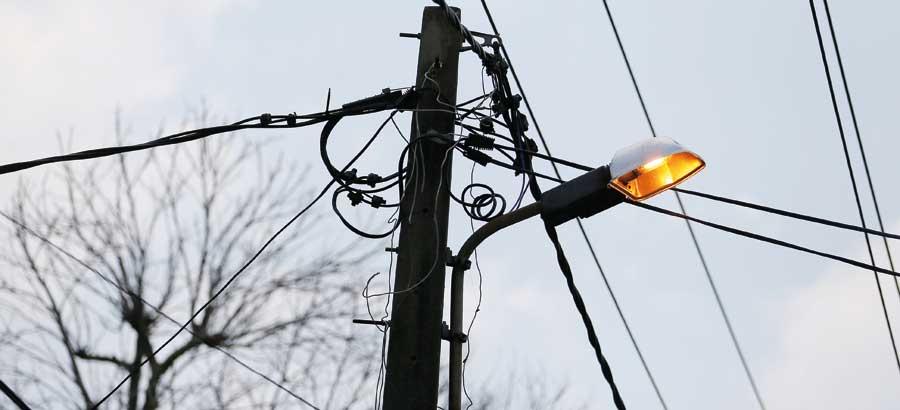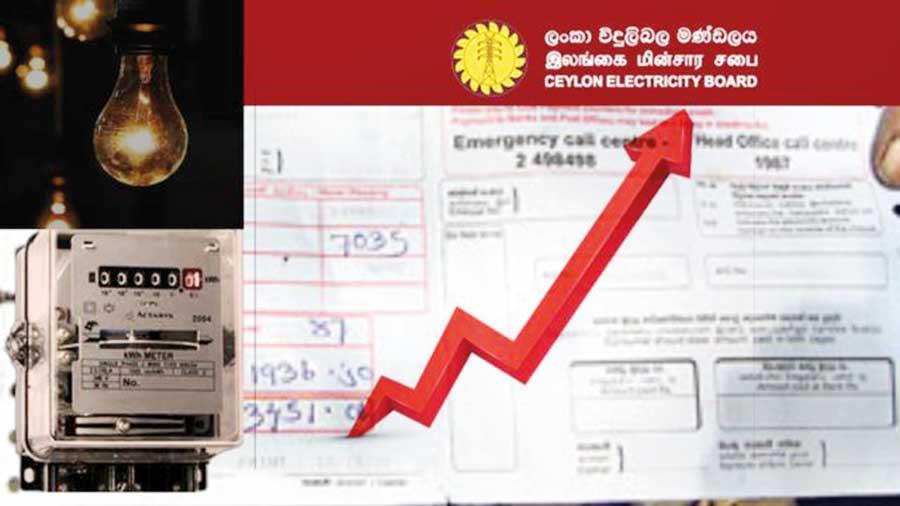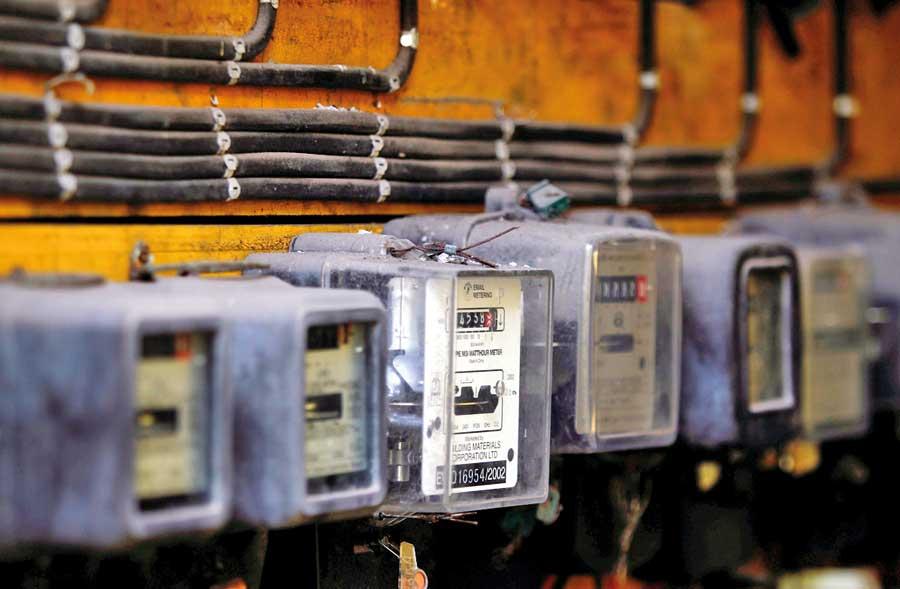01 Mar 2023 - {{hitsCtrl.values.hits}}

Critics are pointing out that CEB authorities are oppressing the innocent who pay electricity bills and trying to cover their losses
The Minister of Energy recently increased the electricity tariffs by 1200 % to cover the losses of the Ceylon Electricity Board (CEB). General Secretary of CEB Trade Union Alliance Ranjan Jayalal recently made a revelation about the politicians who have not paid their electricity bills while the burden is placed on the public to cover the losses incurred by the CEB. He also revealed names of the ministers who did not pay their electricity bills. He said that the CEB should collect a massive sum of 420 million rupees from 54 ministers who haven’t paid their electricity bills, due on 13 November 2022. It was also revealed that the heads of the security forces too haven’t paid their electricity bills amounting to more than 5 billion rupees. The latest audit report revealed that the general consumers have to pay 2000million rupees to the CEB.
Jayalal recently made a revelation about the politicians who have not paid their electricity bills while the burden is placed on the public to cover the losses incurred by the CEB. He also revealed names of the ministers who did not pay their electricity bills. He said that the CEB should collect a massive sum of 420 million rupees from 54 ministers who haven’t paid their electricity bills, due on 13 November 2022. It was also revealed that the heads of the security forces too haven’t paid their electricity bills amounting to more than 5 billion rupees. The latest audit report revealed that the general consumers have to pay 2000million rupees to the CEB.
Usually, if you don’t pay the bill after using electricity, the electricity supply will be disconnected. If the bill isn’t settled the CEB would take away the metre after three months. However, electricity will be restored to the same house under a different name. But during the re-supply of electricity, the unpaid amount will not be charged. As a result the amount to be collected from the public so far is 200 crore rupees, according to the latest Audit Report. Following an investigation it was revealed that the ministers and some officials of the security forces have arranged to pay the electricity bills in instalments and through government ministries.
The CEB should collect the remaining amount from those who have not paid the electricity bill. CEB Trade Union Collective Chairman Malaka Wickramasinghe said that instead the CEB authorities are oppressing the innocent who pay electricity bills and trying to cover their losses.
 The CEB imposed power cuts mantaining that there was no coal, naphtha and diesel to generate electricity. Now the CEB provides continuous supply of electricity by increasing electricity tariffs excessively. In increasing the electricity tariffs the electricity bill has been increased by 1200 percent for those who use the lowest number of units and there is an increase in price by 200 percent for those who use the highest number of units. In Sri Lanka, the cost of producing hydroelectric power is 2.76 rupees per unit of electricity. A unit of electricity costs around 12.76 rupees along with the wages of CEB employees and all other expenses. Wickramasinghe said that even if a unit of electricity is sold at 15 rupees, it is still profitable for the CEB.
The CEB imposed power cuts mantaining that there was no coal, naphtha and diesel to generate electricity. Now the CEB provides continuous supply of electricity by increasing electricity tariffs excessively. In increasing the electricity tariffs the electricity bill has been increased by 1200 percent for those who use the lowest number of units and there is an increase in price by 200 percent for those who use the highest number of units. In Sri Lanka, the cost of producing hydroelectric power is 2.76 rupees per unit of electricity. A unit of electricity costs around 12.76 rupees along with the wages of CEB employees and all other expenses. Wickramasinghe said that even if a unit of electricity is sold at 15 rupees, it is still profitable for the CEB.
According to the power generation plan mapped out by the CEB this year, 4500-gigawatt hours can be generated from hydroelectricity. About 2500 gigawatt hours are required for this year to provide electricity to all consumers who use less than 90 units. That leaves another 2000 gigawatt hours. Before the electricity tariff hike, the electricity bill of those who use less than 30 units was only 130 rupees. But now with the bill increase, the amount will increase to 1500 rupees. That is a 1200 percent increase. But the bill of those who use a high number of units has increased by only 200 percent. It is a slight increase. Earlier, the lowest income earners and those who live on income support of 500 rupees paid an electricity bill of 130 rupees. With the increase, they have to have three months’ income to pay the bill for one month. Those who use less than 30 units of electricity only use a bulb at home. People who use a television or charge a phone consume two units of electricity per day. Those who use a refrigerator consume four units of electricity per day. Wickramasinghe said that using an electric iron costs about 120 units per month.
“As a trade union, we informed authorities that they should not increase the electricity bill of the less affluent. But instead of listening to us or going for another alternative, Minister Kanchana Wijesekera acted to increase the electricity bill of low-income earners - CEB Trade Union Collective Chairman Malaka Wickramasinghe”
Energy Minister Kanchana Wijesekera, who attended a media programme recently, said that the electricity bill was increased based on the methods suggested by the electrical engineers and that he too didn’t support the increase in the electricity bills. The minister pointed out that the amounts of increase in electricity prices were determined by calculating the average value of a unit of electricity. But it costs 2.76 rupees per unit to produce hydroelectricity. It costs 10 rupees to produce a unit of electricity using wind, 30 rupees using solar power and50 rupees using coal. It costs 125 rupees using crude oil, naptha and diesel, and 200 rupees if gas turbines are use. Accordingly, the minister pointed out that the total cost of generating electricity, divided by its average value, is 56 rupees per unit. Hydroelectricity can be provided to those who use 90 units, but electricity is generated from diesel because of the high demand for electricity. The high demand for electricity is caused by a certain group of people. These people have air-conditioned their houses. They use around 300-600 or 1000 units of electricity per month. Electricity is produced with diesel to meet their high electricity demand. Wickramasinghe pointed out that Minister Wijesekera fears that they would leave the system if the electricity bill for them is increased by a high amount.
If the bill is increased for those who use much electricity and they withdraw from the system, the solution to the electricity crisis is right there. They will switch to solar power or some other option and fulfil their electricity needs anyway. Otherwise, the price of an electricity unit can be increased at the time they consume electricity excessively. “As a trade union, we informed authorities that they should not increase the electricity bill of the less affluent. But instead of listening to us or going for another alternative, Minister Kanchana Wijesekera acted to increase the electricity bill of low-income earners,” Wickramasinghe said.

Consumers might be tempted to cheat
There are 4.7 million people who use less than 90 units of electricity. About a million of them are at risk of losing their power connections. It will not be a problem if only one house in a village sees the electricity supply being disconnected due to non-payment of the electricity bill. Wickramasinghe pointed out that if electricity will have to be disconnected for a whole village, it will be a serious issue. Sometimes people will be tempted to obtain electricity in an illegal manner. Meter readers, maintenance units and those tasked with disconnecting electricity will not be able to perform their duties. Likewise, if the consumers stop paying their electricity bills the CEB’s current loss would increase from 8.5 percent to 16 percent. Therefore, we, as a trade union, would like to ask the authorities who have made plans to increase the electricity price to make public their own electricity bills, Wickramasinghe said. This government is suppressing the poorest to provide electricity to the upper class who use more than 300 electricity units, he added.
The CEB could not provide electricity to students preparing for the Advanced Level Examination for 14 consecutive days. At that time, there was enough coal, naphtha and diesel to provide electricity. As soon as the bill was increased, the minister acted to ensure a continuous supply of electricity. The minister recently announced that he had obtained loans from Bank of Ceylon and People’s Bank to purchase diesel, naphtha and coal to provide a continuous supply of electricity. The CEB authorities dream that the revenue generated from the increased electricity bills will be received from next May. But given the current economic situation in the country, the people are struggling to make ends meet. In such a situation, granting loans to the CEB will put the state banks and the petroleum corporation at risk. Wickramasinghe also pointed out that in the midst of all these issues the authorities are now trying restructure and privatise the CEB.
According to the Minister, the electricity tariffs had been increased in keeping with the guidelines provided by the electrical engineers. But the Co-secretary of the CEB Engineers Union Isuru Kasthuriratne said, “There is a guideline to set electricity tariffs. Electrical engineers provide all relevant data to the Public Utilities Commission. Then the Public Utilities Commission sets the electricity tariffs. That was the system till 2021. After 2021, the Public Utilities Commission informed the CEB to prepare the tariffs itself. Then the CEB prepared the tariffs and submitted them to the Public Utilities Commission. The tariffs were calculated covering every field. This time, the electrical engineers prepared the electricity tariffs following cabinet orders. An order given by the cabinet was that no electricity subsidy should be given to any household or religious place. In that case we prepare tariffs according to the cost of production. The IMF gave instructions to calculate tariffs so that the cost of production is billed.” Kasthuriratne said that the IMF is directly behind the increase in electricity bills.

The bills of consumers, who use fewer units, were increased while the bills of those who use more units were reduced according to the IMF conditions
“The bill of the consumer, who uses fewer units, was increased while the bill of those who use more units was reduced according to the IMF conditions. But as electrical engineers, we also pointed out that separate tariffs should be set up for those who use more units. That is what should happen. We were asked to increase the tariffs. If we, as electrical engineers, had prepared the tariffs, we would never have increased tariffs in this manner. If the tariffs had been calculated taking into account the actual costs, we would have had the opportunity to calculate a 60 percent or less increase,” Kasthuriratne explained.
“We are not satisfied with the coal and diesel prices we were informed of when setting up tariffs. Diesel and coal vessels are subject to VAT while they are at sea. VAT will also be charged on the electricity bill. In addition to the tax charged when a diesel ship arrives, the government also charges a separate cost of production tax. Naphtha which was at 165 rupees was increased to 220 rupees. The price of a barrel of crude oil in the world market has decreased by about 15 percent. It has reached the same price as in 2021. A metric ton of coal has dropped below 160 US$. But we import coal at 240-250 US$ per metric ton,” said Kasthuriratne who pointed out that the electricity consumer does not enjoy that advantage.
“This time, the electrical engineers prepared the electricity tariffs following cabinet orders. An order given by the cabinet was that no electricity subsidy should be given to any household or religious place. In that case we prepare tariffs according to the cost of production. The IMF gave instructions to calculate tariffs so that the cost of production is billed - Co-secretary of the CEB Engineers Union Isuru Kasthuriratne”
“The government is now making plans to restructure the CEB. Three foreign companies have got cabinet approval to import oil. Those companies know that they can obtain maximum profit by importing oil. A barrel of premium crude used to cost 9 US$. Now we have to pay more than 30 US$ per barrel along with insurance charges and other charges. Moreover, millions of dollars have to be paid as late fees for the vessels. Therefore, three foreign companies were allowed to import oil in the hope of gaining more profit. Similarly, when electricity generation is given to three companies, those companies will also be able to obtain maximum profit. When those companies bring in cheap naphtha, diesel and coal, they can sell electricity at a higher price retaining more profit. According to an IMF proposal, the tariffs were increased. But the IMF did not ask to restructure the CEB. A diesel power plant can cease operations if the consumption of heavy users can be reduced,” said Kasthuriratne who added that if that was the case, there would be no need to increase the electricity bill.
The Daily Mirror contacted CEB Chairman Nalinda Ilangakoon. The Chairman said that he was having a discussion with the Minister of Energy and hung up. Several attempts made to contact him later proved futile.
This newspaper then made attempts to contact CEB General Manager Rohan Seneviratne to inquire into all these matters, but an official at his office said that the General Manager wasn’t available.
We reached CEB Media Spokesperson and Additional General Manager Navaratne and he said that he was at an urgent meeting. He asked for the author’s mobile number promising to call back, but he never did.
Attempts made to contact Energy Minister Kanchana Wijesekera were also futile.
23 Nov 2024 24 minute ago
23 Nov 2024 44 minute ago
23 Nov 2024 2 hours ago
23 Nov 2024 3 hours ago
23 Nov 2024 3 hours ago